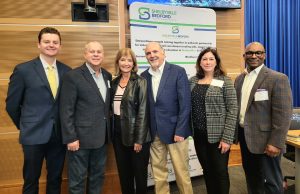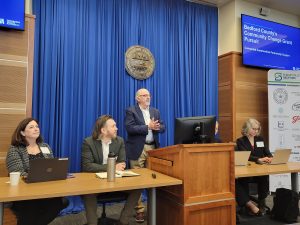Bedford has chance to receive millions in grant fund
STAFF REPORT

Some of the representatives who attended the Connect Communities workshop last Thursday. From left, Blake Neely, field rep. for Sen. Marsha Blackburn’s office; Bedford County Mayor Chad Graham; Beth Harwell, member of the board of directors of TVA and the former Speaker of the House; County Commissioner Greg Vick; Georgia Caruthers, TVA’s Connected Communities Senior Project Lead; and Shane Hooper, Shelbyville-Bedford County Partnership CEO. (Photo by Zoe Watkins)
Bedford County has the chance to secure up to $20 million in non-matching grant monies through the Tennessee Valley Authority’s Connected Community program.
A workshop was held with various TVA members, Bedford County officials, and local area leaders. Meeting at the Student Union at Middle Tennessee State University, the group clarified and established stakeholders for funding pursuit and identified next steps.
Addressing the Bedford and regional representatives, Georgia Caruthers, TVA’s Connected Communities Senior Project Lead, said, “This is the biggest and probably the best partnership we have. This is a new initiative we started about three years ago in TVA.
“We are now in the process of offering this tailored support and success coaching, which is what we’re doing here today,” she said. Representatives from national consulting group Guidehouse were also at the workshop.
Bedford County is one of six other communities selected to complete this program. Other communities include places like Fayetteville, Roane County, and Mayfield, K.y., and Athens, Ala.
“The way Bedford County was selected, we’re looking for more rural communities but with a lot of heart and capacity to work with us to execute something,” said Caruthers. Since the local power companies are TVA customers, they approached Duck River Electric who in turn got the county government involved.
These “Connected Communities” are towns, main streets, neighborhoods, and cities using tech- and data-related solutions to address community challenges while preparing for a modern energy system.
Through this program, the county will be guided through applying for the Community Change Grant, which is a “climate-focused grant” issued by the Environmental Protection Agency (EPA) as part of the Inflation Reduction Act (IRA). It’s a rolling application that runs through November of this year with an opportunity for rejected applications to reapply following debrief with the EPA.
Bedford County was qualified as an eligible community because it is defined as “disadvantaged” on the EPA’s IRA map.
Disadvantaged status is determined by the EPA based on economic status, pollution burden, and underinvestment in housing, transportation, water and wastewater infrastructure, and healthcare.
Through this, there is some $2 billion available for community projects addressing “climate change.” In this first round of grants, 150 projects are projected to be awarded, with each award being $10 to $20 million.
Examples of these eligible projects are EV-focused manufacturing training, mobility improvements, and energy efficiency upgrades.
So how can Bedford fit into this grant’s requirement mold?
Through previous discussions, the group identified two key priorities for Bedford:
Position Bedford County to capture growth in the electric vehicle industry
Improve local transportation options, including exploring electric vehicle transit
A requirement for the grant application is to describe how their workforce development program will support the reduction of greenhouse gas emissions or other air pollutants. Bedford County, according to Shelbyville-Bedford County Partnership CEO Shane Hooper, is poised for developing a clean-technology workforce, especially with the development of Duksan Electera, an EV electrolyte factory, located at the U.S. 231 Industrial Park.
“We’re prepared to capture growth in the electric vehicle industry,” said Christian Bergland from Guidehouse. “We’re also looking at improving local transportation options, particularly, with the new TCAT campus going in and the MTSU aeronautics campus—how do we make sure people can actually get down there?”
Some additional potential pathways that aligned with Bedford County goals include improving livability with pedestrian, bike, and other transit improvements, and enhancing energy efficiency of public buildings.
“This opportunity is not enough to solve everything. It’s not going to fix everything. It’s not enough money to change everything in the county, but it’s enough to spark something,” said Bergland.
Other priorities also included developing high-tech education and jobs while maintaining rural character; ensuring quality, affordable housing; strengthen tourism; expand rural broadband access; and expand public engagement.

From left, Georgia Caruthers, Christian Bergland, Greg Vick, and Nicole Wobus.
Applicants are required to include at least one “Climate Action strategy” and at least one “Pollution Reduction strategy.”
As an example, one of the possible pathways to pursue is reducing pollution from airports – which would fall under the pathway of improving transit. This electric aviation element could make the application “appealing,” according to Bergland.
Shelbyville Municipal Airport Director Paul Perry was in attendance at last Thursday workshop.
Perry said MTSU uses 30,000 gallons of avgas a month. He explained that sustainable fuels are “falling flat” and electric is “catching up.”
“My concern with this is only that it’s a little farther out,” said Perry. But, he added, that Shelbyville is a prime location for charging stations for cargo planes coming to and from Birmingham, Louisville, and Atlanta.
“Zero emissions is a huge order of topic across all business aviation,” said Perry.
The grant could also provide funds to create energy efficiency programs aimed at Bedford County homes, such as through adding smart thermostats and helping the housing authority build energy-efficient homes.
The group’s next step is to work with the stakeholders to begin developing the different portions of the application, which they hope to turn in by July. Essentially, the application will tell the story of why Bedford County should be one of the 150 communities awarded this grant.
“There needs to be a cohesive story,” said Bergland. “Telling that story around, ‘This is the thing we’re trying to do,’ is really important. It can’t just come across as a laundry list of things to do. I think we’re in a really good position to do that.”





![For-Tips-and-Ideas-Phone-300x250-Bedford-County-Post[1]](https://www.bedfordcountypost.com/wp-content/uploads/2023/09/For-Tips-and-Ideas-Phone-300x250-Bedford-County-Post1-300x250.jpg)
![Subscribe-Now-300x250-Bedford-County-Post[1]](https://www.bedfordcountypost.com/wp-content/uploads/2023/09/Subscribe-Now-300x250-Bedford-County-Post1-300x250.jpg)
